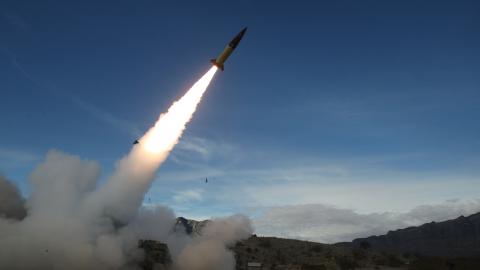Ukraine carried out several strikes last week against Russian targets in occupied Crimea. British Storm Shadow cruise missiles were used in a spectacular attack that destroyed a large Russian amphibious assault ship and a $300 million attack submarine, the first time Russia had lost a submarine in combat since the Second World World War.
About 24 hours later, another Ukrainian airstrike hit one of Russia's valuable S400 air defense systems in Crimea. The success of these airstrikes against such major targets in Russian occupied Crimea is important for two reasons.
First, it is proof that Ukrainians are quick learners, and if given the proper weapons and equipment they can deliver major blows on the battlefield. Until this summer, many observers thought Ukraine lacked the ability to hit targets Crimea in any meaningful way. Clearly that is no longer the case, which is a wake-up call for the Russian military command.
Second, there are many who believed that Ukrainian attacks against Russian forces in Crimea would immediately spark a major escalation in the conflict. Although Crimea is a part of Ukraine under international law, Russia annexed the peninsula in 2014 and maintains a large military presence there. Some international observers have suggested that Russia’s military presence in Crimea is so important that Moscow would resort to drastic and desperate measures if it were ever jeopardized. So far at least, the successful Ukrainian airstrikes have not led to any major escalation in the war.
The timing of Ukraine’s strikes in Crimea could not have been better for Kyiv. For months, Ukraine has been asking the US for the MGM-140 Army Tactical Missile System. And for months President Joe Biden has said no.
ATACMS are ballistic missiles with a range of 300 kilometers, meaning that Ukraine could hit Russian targets in Crimea. Each missile can deliver a payload somewhere between 160 kg-560 kg of explosives, depending on what type of warhead is used. In simple terms, these tactical missiles can pack a punch. In addition to the US, ATACMS are used by several countries around the world. They are particularly popular in the Gulf with Qatar, Bahrain, and the UAE keeping them in their inventories.
Despite calls from many in Congress, the Biden administration has been reluctant to provide these missiles to Ukraine. At first the White House’s excuse was that delivering such a weapon would be overly provocative to Russia. Then, after the UK and France gave Ukraine air-launched cruise missiles, which offer a similar capability, the White House said Kyiv was no longer in need of ATACMS. Now that Ukraine has used these cruise missiles against Russian targets in Crimea, and the worst-case scenarios of escalation envisioned by the White House never materialized, there is now no excuse for Biden.
While the US has provided an impressive amount of military aid to Ukraine over the years, it has always seemed to be one step behind events on the ground. For example, soon after Russia invaded Ukraine the first time in 2014, the Obama administration was criticized for sending only military rations and winter blankets. The Trump administration deserves credit for finally providing Ukraine with anti-tank missiles in 2019, but even these were given to Kyiv on the condition that they would remain locked up far behind the front lines.
It took the final realization of Russia’s large-scale invasion of Ukraine in February 2022 for the US to start sending weapons and munitions in any meaningful amount to Kyiv. However, there have been frustrating delays along the way.
Many Republican and Democrat members of congress have complained that Biden has not given enough of the right type of weapons to Ukraine, and has often dithered when it comes to providing Ukraine with the most important weapons. Good examples of this include the long delays and decision-making processes for Biden to approve the transfer of multi-launched rocket systems, Patriot air defense systems, Abrams tanks and F-16s to Ukraine. Had these weapons, along with ATACMS, been given to Ukraine sooner the situation on the battlefield would look a lot different today.
It is a critical time for Kyiv. Ukraine is in the middle of its 2023 counteroffensive and is facing stiff resistance from entrenched and well defended Russian positions. Advancements have been made by the Ukrainian military in some parts of the country, but it has been slower than many had expected. Meanwhile, thousands of kilometers away, the US Congress is starting another debate about whether to provide Ukraine with billions of dollars in more military, economic, and humanitarian assistance.
Biden should use this opportunity to send a strong signal of support to Kyiv by immediately sending ATACMS. These would allow Ukraine to disrupt Russian supply lines in a major way. They would make it untenable for Russia to keep bombers and warships in Crimea. They could also be used to strike the launch sites for Iranian drones located in Crimea. Not only would this save civilian lives, but it could also bring the war to an end faster.
After this week’s successful strikes against Russian targets in Crimea using British supplied cruise missiles, there’s no longer an excuse for the White House not to provide the ATACMS. It’s time Biden started wanting Ukraine to win the war more than merely hoping Russia will lose.
America’s friends and adversaries are watching.















